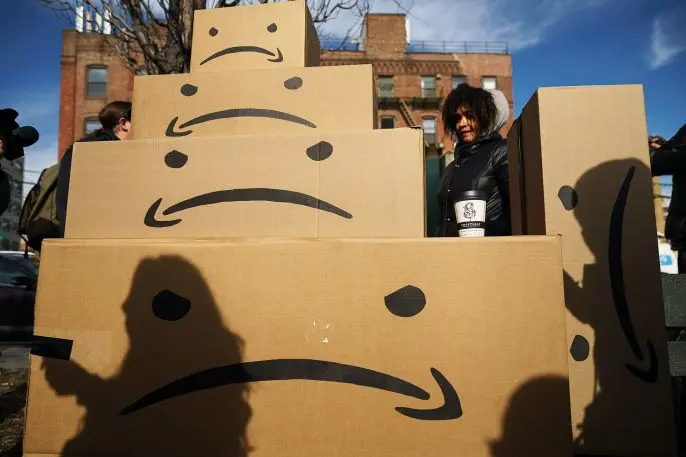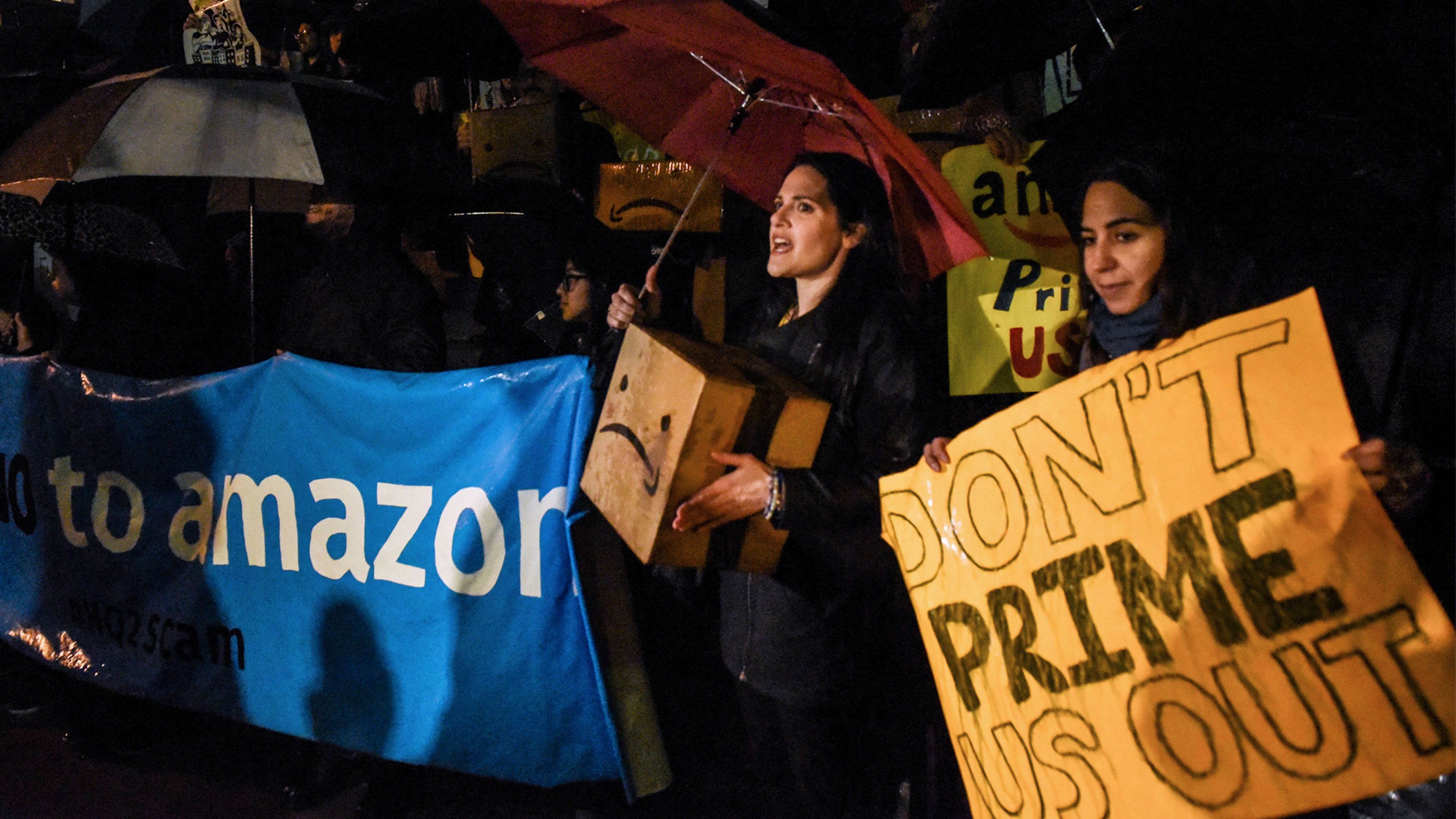It’s been just over month since Amazon announced the end of its the protracted search for its second headquarters and announced it would be expanding to Long Island City, New York, and Crystal City, Virginia, and adding an “operations hub” in Nashville. But rather than acclimating to the idea of Amazon in their midst, organizers in the three cities are doubling down on resisting it.
Beginning on December 15, coalitions of community groups in northern Virginia, Nashville, and New York are flooding public forums and meetings of elected officials to bring the perspective of their members into the Amazon discussions–where organizers say it’s been notably lacking all along. In Nashville, organizers will meet at the local Industrial Development Board to try to gain insight into the deal (the details of which have still not been made public) and put pressure on the board to demand community benefits from Amazon before it moves to a vote for approval. In northern Virginia, activists are demanding that elected officials in Arlington County–who will ultimately vote to approve Amazon’s arrival–will protect communities most at risk for displacement due to Amazon’s arrival. And in Long Island City, activists are calling on local leaders to rescind the deal with Amazon–and reapportion the subsidies they have slated for the company to fund community needs.
The search that resulted in the two HQ2 sites in Long Island City and northern Virginia, as well as the new operations center in Nashville, gained attention for its secrecy. Rather than going through a public process, Amazon held private meetings with some local leaders to secure incentives for its arrival. In New York, for instance, Amazon is expected to receive nearly $3 billion in subsidies. Virginia, in addition to raising a tax on hotel rooms to pay for Amazon’s arrival (and rebranding its headquarter location as “National Landing“), promised to give the e-commerce giant advance warning of any Freedom of Information Act requests filed by reporters or activists, essentially ensuring the company will have time to cover itself before falling under public scrutiny. Both cities will use public money to fund helipads for upper-level Amazon employees.

Not according to Odessa Kelly, an organizer with Nashville Organized for Action and Hope, an interfaith group in the city and a member of the coalition Stand Up Nashville. In all three cities, unemployment is low, but housing and cost of living are already high, and Amazon’s presence could make them rise further. “Amazon is coming in saying they’ll bring six-figure jobs, but who is going to get those jobs?” Kelly says. “I have a feeling they’ll try to move people from Seattle, instead of uplifting the citizens here.” Organizers in New York and northern Virginia have expressed similar concerns. Lee Carter, a socialist state representative from Manassas, Virginia (just outside of Arlington County), has spoken out against Amazon’s presence in the region, saying it will exacerbate unaffordability and doesn’t offer real benefits. “There’s this conventional wisdom that says, ‘More jobs magically fix everything’,” he said in RVA magazine. “That’s not what we need. We need the jobs we have to pay better.”
But the issue of jobs–who they are for, and what they will be–is just one question mark for communities as they try to predict the effect of Amazon on their region. “We just don’t know,” is one of the main refrains from organizers. “The community groups we partner with are concerned about the lack of transparency in the process,” says Danny Cendejas, an organizer with the northern Virginia Latinx advocacy umbrella group, La ColectiVA. “It’s repeating a cycle of exclusion where the people who are most going to be affected by this are the ones who are left out.” He cites the fact that in Northern Virginia, most homeowners are white, while minorities are mainly renters, and could see their homes priced out from under them as Amazon moves in. On Arlington County’s Spanish website, there’s not a single mention of the Amazon deal. Roshan Abraham, another organizer, says the county has done no outreach to groups who stand to be affected by Amazon.
This is what the actions before the holidays aim to address. “We’re working with organizations and locals to formulate demands along with community folks, to get that process that government officials should have had,” Cendejas says. “A big thing that we’re thinking about is that this can’t be the status quo–we can’t have the secrecy between officials and businesses.” On December 15, activists attended a meeting of the Arlington County Board to express concerns about the lack of outreach to communities of color, and to call for Spanish translation at all future events related to the Amazon deal between now and February, which is when the Arlington County Board will hold an initial vote to approve Amazon’s arrival. The board is likely to authorize the tech company’s expansion in the region, Cendejas says, but there will be a series of votes in the years to come about more particular points of the deal, like what percentage of local people will be hired to fill the promised 25,000 jobs. La ColectiVA aims to have a consistent presence at board meetings through February. The group, Cendejas says, aims to ensure that vulnerable residents of the area will receive protection against rising rents, and be able to access the benefits that Amazon will reportedly attract, like stronger schools and public transportation. (We reached out to Amazon for comment, and will update the story if we hear back.)
In Nashville, the Stand Up coalition, comprised of grassroots groups and labor unions, last year secured the passage of the Do Better Nashville bill, which mandates full transparency and opportunity for community input into planning and development decisions. The Do Better bill was actually inspired by the HQ2 process, Kelly says. But the city seems to have gotten around the mandates of the bill because the local chamber of commerce, which is a private entity, made the deal with Amazon, not the mayor’s office. Elected officials know that the chamber offered to pay the company $500 for each of the 5,000 promised jobs created. That could add up to $15 million, which to organizers like Kelly is hard to stomach, given the city’s difficulty funding necessities like public education. And the finer points of the deal are still under wraps. Council members, for instance, don’t know if the jobs will go to local workers, or if Amazon will pledge to fund housing or transportation in exchange for its presence. “That doesn’t sit well with people,” Kelly says. So she and Stand Up are meeting at the office of the Industrial Development Board, which approves all developments, to ask them to apply the standards of the Do Better law in considering the Amazon proposal, and to relay the particulars of the deal to the larger Nashville community so they can formulate an informed response.
New York community groups, though, already have their response to Amazon prepared–and it is a firm no. On December 19, activists lead by Alliance for a Greater New York (ALIGN) and New York Communities for Change will travel up to Albany, where the state’s Public Authority Control Board is meeting. “They won’t be voting on the deal that day, but this is the group that will eventually vote on whether to let Amazon come to New York, and we want them to understand that they should vote no, and what the impact will be on communities if they don’t,” says Maritza Silva-Farrell, the executive director of ALIGN. They have the backing of elected officials like the local council member for Long Island City, Jimmy Van Bramer, and Senator Kirsten Gillibrand (D-NY), who object to the lack of transparency around the deal, and its potential effect on communities.
In New York, Amazon has already drawn ire for choosing a location very close to one of the largest public housing developments in the country, but offering a flimsy-at-best promise to conduct outreach and job-training programs for people living there. Under the deal, Amazon will send representatives to job fairs and resume workshops at the Queensbridge Houses for three years beginning in 2020, but details of what types of job training services the company will offer are vague.
For Silva-Farrell and other organizers, looking to other communities where Amazon has a presence tells them all they need to know. Looking to Seattle, which is a hotbed of housing unaffordability, thanks in part to the tech giant, has her concerned about housing costs. Reports of poor labor conditions, like from the East African fulfillment center workers currently striking in Minnesota, makes her think that the company does not prioritize workers’ well-being. “Amazon puts a burden on communities more than actually helping them,” she says. “That is not the kind of model that we want in New York.” One report has found that the arrival of Amazon could cost the city 1,500 affordable housing units that were planned on land now ceded to Amazon.
There is no way, the organizers say, to know what effect, if any, their actions this week will have on Amazon’s plans. Silva-Farrell is cautiously optimistic: She helped spearhead a campaign in 2012 to stop the development of a Walmart in East New York; there now, instead, is a grocery store whose workforce is unionized. But she, Kelly, and Cendejas are all aware that killing or altering a deal that drew as much attention as the HQ2 search will be a long and difficult, and perhaps ultimately fruitless, process. The actions this week are a first step, and going forward, they plan to work collaboratively to support the efforts in all three cities to land on a more beneficial arrangement for the communities they represent. The efforts in all three cities have support from the Partnership for Working Families, which advocates for community-led and equitable development. “That’s something we’re looking to do more of,” Cendejas says.
Recognize your brand's excellence by applying to this year's Brands That Matters Awards before the early-rate deadline, May 3.
